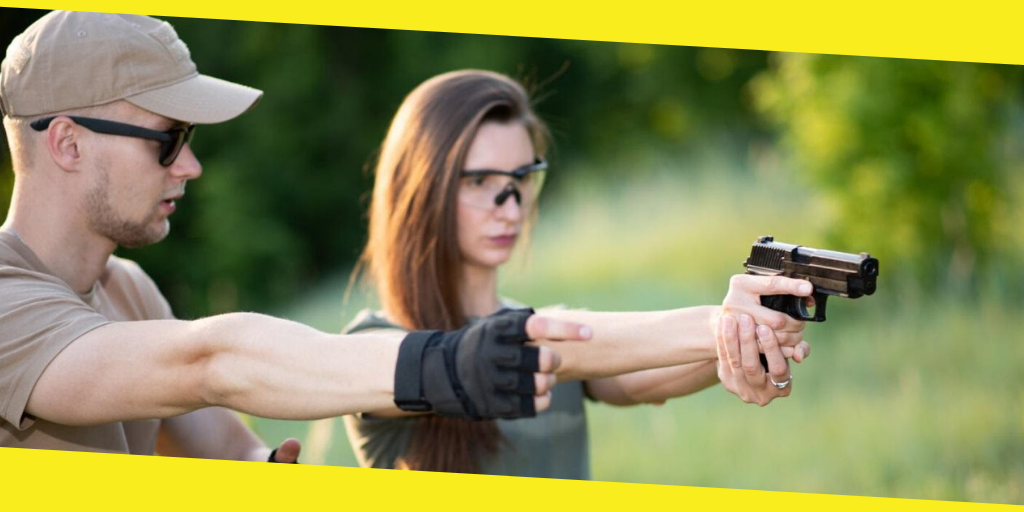Don’t Shoot! 8 Rules of Firearm Safety You Need to Know
This post was last updated on March 20th, 2024

Want to buy yourself a firearm?
You’re not alone! 30% of the population already owns a gun.
Rest assured, with whispers of stricter legislation, many more are sure to acquire one. Moreover, if they’re over 18 and have committed no serious offenses, then they’re well within their constitutional rights to do so.
Indeed, for countless people, the right to bear arms is seen as a fundamental part of being American. Take those guns away and there’d be riots on the streets.
This right should never be taken lightly, though.
Everybody must know and abide by the essential rules of firearm safety.
These are lethal weapons after all! Failing to follow strict rules and safe practices is a recipe for disaster. Gun-related accidents happen with frightening frequency; people get injured and die as a result.
Want to learn how to handle, store, and operate your firearm in a safe and controlled manner?
Keep reading for 8 essential gun safety rules and good practices.
1. Don’t Be a Fool
Or, in other words, show some respect for your weapon.
What do we mean by that?
It goes back to what we mentioned in the introduction: the item in your hands can kill. If you’re not careful, you can take somebody’s life (including your own), or cause life-changing injuries.
Sure, that weapon holds a key to self-defense, protection, sport, and hunting. Yet, in the blink of an eye, it can alter the course of your life and those around you as well.
That’s a serious responsibility. Never take it lightly.
Look, we don’t want to scare you into choosing not to purchase your firearm or an ar10 build kit. As we said, it can be a mighty force for good. It just makes plain sense to treat it with respect.
Moreover, this isn’t a situation where you’d ever want to learn from your mistakes! Rounds of lead tend not to be particularly forgiving. Be sensible with your firearm from the very beginning and don’t let yourself get into bad habits.
Take that approach and you’ll be far less likely to suffer an accident.
2. Assume It’s Loaded
This point leads on from the last.
Get into the habit of assuming your weapon is loaded. It’s a sure-fire way to start treating the weapon with respect and being sensible when handling it.
You might know that there’s no round in the chamber. However, there have been plenty of people who ‘knew’ that, only to put a hole in themselves soon after.
Assume the worst. Get it into your head that there might be a bullet inside.
It’s far better to be safe than sorry.
Likewise, never point the gun at somebody. Never let somebody else point the gun at you. Never joke around and pretend to fire at your friends or family. It isn’t funny or clever.
Worse, pulling that AR 15 trigger might be the last time you see them.
3. Only Point It at Things You’re Willing to Kill
This could easily have been rule number one on this list.
You know that your firearm is a lethal weapon. As such, it makes sense to only ever point it at things you’re ready to put a hole in (and potentially kill).
In other words, don’t joke around.
It’s all too common for someone to point their weapon at somebody in jest. They (remember our last rule) believe it isn’t loaded, pull the trigger, and bang. Someone they love loses their life.
Stick to this rule like glue. It’s a quick and easy way to steer clear of trouble.
4. Stay Away From the Trigger
What’s the most lethal part of a firearm?
The bullets? The chamber? The person holding it?
Of course, all of those things contribute to the danger involved. However, the primary feature to be wary of is this:
The trigger.
Without the trigger, that weapon will not fire. With it, the hunk of metal in your hand holds the key to life and death. Whenever you put your finger on it, then, you’re playing with fire.
The best way to avoid trouble?
Keep your finger off it whenever you don’t intend to shoot. Stay away from the trigger whenever you’re holding the firearm and waiting, walking, or doing anything apart from firing.
As you can already tell, staying safe with your weapon is all about accident prevention. It’s about doing whatever it takes to avoid unintentional harm to yourself or anyone else. Keeping your finger off the trigger is one of the most sensible practical steps to achieving that goal.
5. Risk Assess Before Shooting
As the old adage goes:
Failing to prepare is like preparing to fail.
We already know never to point our weapons at anything we don’t want to put a hole in. Let’s assume we’ve followed that rule and headed down to the range.
This is, of course, the perfect place to practice. It’s literally set up to be a safe and secure environment in which to shoot a firearm.
Even so, the next step, when you’re just about to pull the trigger, is to do a risk assessment.
What are the risks involved with firing your gun? Is there anyone around you who might suffer? Are you wearing your personal protective equipment (more on this later)?
Run through those sorts of questions in your head.
Doing so will set you up for a safe and uneventful shooting experience. Even better, it’ll translate over to other areas as well.
For example, you might be out hunting. Suddenly, there are none of the safety measures in place at the range; doing a risk assessment is far more important. What might happen if you missed the target? Are there other people, animals or objects around that might suffer from your shot?
Assessing the risk in this way will help you avoid any accidents waiting to happen.
6. Practice Makes Perfect
It pays to remember that shooting is a skill.
And, like any new skill, mastery of it takes significant practice.
You can’t pick up a weapon for the first time and expect to be a first-class shot. Sure, some people have a natural aptitude for it. Everything for their balance to their vision makes them a great marksman from the get-go.
For the vast majority of us, though, it takes work.
Think of it like learning an instrument. Nobody’s born a maestro! You’d never expect to play the piano like Mozart without years and years of constant practice.
The same goes for shooting. Don’t assume you’ll be an effective marksman.
It’s never enough to just buy a weapon. You have to hit the range on a regular basis, sending thousands of rounds down onto the target. In time, you’ll turn yourself into a pro. Not only will you become a better shot, but you’ll learn exactly how to use the weapon safely.
Even better, you’ll get a flood of mood-enhancing neurochemicals each time!
7. Purchase Personal Protective Equipment (PPE)
You’ve bought yourself a firearm.
You’re understandably excited. You can’t wait to get down to the range, or out into the yard, to fire some lead at a target.
However, you soon realize that shooting is a loud pastime! Every shot rings in your ears and leaves you deaf for some time after. Likewise, you notice small shards of metal firing into the air on occasion too. You wouldn’t want them going into your eyes.
It’s time to invest in some PPE! This is the vital ingredient for firing in far greater comfort.
Get yourself some eye and ear protectors. Sure, you won’t look as cool as they do in the movies. You will, however, safeguard your hearing and sight from harm.
And, in your bid for a long and happy life of shooting, that’s priceless.
8. Never Store a Loaded Gun
Last but not least for firearm safety is this:
Never put your gun into storage with a bullet in the chamber. When you’re finished firing and are putting it away, be sure to remove the ammunition first.
Once again, it’s about limiting the chance of disasters happening.
We’re forever hearing horror stories of children playing with their parents’ guns when they’re not supposed to. They don’t realize it’s loaded and bang, someone gets hurt.
Similarly, imagine going a while without getting the guns out. You might forget that you left bullets in the weapon and inadvertently pull the trigger. Someone in the wrong place at the wrong time could easily suffer.
We understand the desire to leave your weapon loaded (what if there’s a threat and you need it in a hurry?). It isn’t worth the risk. A better solution is to keep the ammunition close by instead.
Follow These Rules of Firearm Safety
It’s your constitutional right to purchase a firearm in America.
But that doesn’t give you the right to treat gun ownership lightly. Doing so can have grievous ill-effects. Hopefully, the rules of firearm safety above will help you and those around you remain safe.
Want to read more articles like this one? Check out similar posts on the ‘Life Skills’ section of the website now.
Recommended For You
How to Stop Worrying Over Small Things?
Most Inside
Most Inside offers high-quality recommendations and valuable updates to enhance all aspects of your life, providing premium guidance and enriching experiences.




